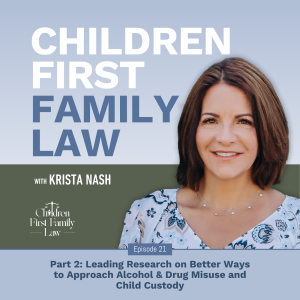
Monday Feb 24, 2025
021: Part 2: Leading Research on Better Ways to Approach Alcohol & Drug Misuse and Child Custody
Maintaining a child’s attachment to a parent with substance abuse issues can be a complex path to navigate. With advice from experts and keeping the child’s best interests first and foremost, parents and courts can successfully co-parent and maintain a healthy parent-child relationship.
This episode of Children First Family Law is part two of Krista’s two-part series on navigating substance misuse issues alongside co-parenting in a divorce situation. While citing the research and expertise of Dr. Stephanie Tabashnecke, Krista highlights the vulnerability of children in a family law case when a parent is struggling with substance abuse. She shares the underlying causes of this disorder and why understanding it can help both parents cope while keeping the child’s best interests at the forefront of their co-parenting conversations. You’ll hear why relapse is an expected part of struggling with this disorder, the top ten myths surrounding substance abuse, and how disrupting a child’s attachment to a caregiver can impact their lifelong health. Krista explains how to set up a treatment plan that continues communication with the child, the importance of using a trauma-informed approach, and her top ten tips for judges and attorneys handling cases involving parents with substance abuse issues.
Understanding the science at play behind a substance abuse disorder can help guide parents to a solution that benefits parents and child and ensures the child’s needs are met throughout the process. Don’t miss this deep dive into the science and expertise to guide you through the complexities of a substance abuse disorder.
In this episode, you will hear:
- Leading current thoughts on the nuances of dealing with sobriety issues of parents in family law cases, considering strongly safety of children while balancing attachment needs of children
- Input from leading experts such as Dr. Stephanie Tabashneck, leading Harvard psychologist and lawyer, who provides background insight to help family court professionals and parents navigate this challenging area
- The vulnerability of children in a substance abuse situation and the lines of protection the court and attorneys may invoke
- Understanding the underlying factors that can trigger a substance abuse disorder and the consensus in the medical and scientific communities to treat them as chronic conditions
- Relapse is part of a substance abuse disorder, and improper treatment, stress, and unmanaged co-occurring conditions can increase relapse risk
- Finding strategies to meet the attachment needs of children and avoiding overreaction to relapse
- The 10 myths surrounding substance abuse and the factors that increase a predisposition to addiction
- Seeking a dopamine “hit” and the impact substances can have on the dopamine baseline
- Role of genetics in substance abuse
- Attachment in children and the impact messaging can have on that attachment, especially as it relates to substance abuse
- Creating treatment plans that work for families logistically and financially and the components of a good treatment plan
- The Optimal Parenting Time Decision Tree criteria used by professionals to evaluate optimal parenting time
- Assessments, testing for alcohol and drug use, and questions to consider
- Having a plan in place in the event of a relapse with specificity and creating a parent plan for this scenario
- The impact on child attachment when completely removing a caregiver from their lives and mitigating this issue
- Using a trauma-informed approach for the parent experiencing substance abuse
- The top 10 tips for judges and attorneys in cases involving parents with substance abuse
Resources from this Episode
- Children First Family Law: www.childrenfirstfamilylaw.com
- American Society of Addiction Medicine: www.asam.org
- Center for Disease Control and Prevention: www.cdc.gov
- Center on the Developing Child at Harvard University: www.developingchild.harvard.edu
- Guidelines for Court Practices for Supervised Visitation:
- www.mass.gov/files/documents/2018/11/29/supervised-visitation-guidelinesfinal%20%281%29.pdf
- National Association for Children of Addiction: www.nacoa.org
- National Institute on Drug Abuse: www.drugabuse.gov
- National Institute of Mental Health: www.nimh.nih.gov
- Ruth Potee, M.D.: www.ruthpotee.com
- Smart Recovery: www.smartrecovery.org
- Standards for Supervised Visitation Practice: www.svnworldwide.org/attachments/standards.pdf
- Substance Abuse & Mental Health Services Administration: www.samhsa.gov
- Substance use and parenting: Best practices for family court practitioners: www.afccnet.org/LinkClick.aspx?fileticket=-RkXrNzIkr8%3d&portalid=0
- Tabashneck, S., Drozd, L. & Soilson, J. (in press), Substance Use Disorders: A Primer for Family Dispute Resolution Practitioners, book chapter: The Family Dispute Resolution Handbook. (editors: P. Salem, & K. Brown-Olson) https://global.oup.com/academic/product/family-dispute-resolution-9780197545904?cc=us&lang=en&
- This Naked Mind: thisnakedmind.com
All states have different laws; be sure you are checking out your state laws specifically surrounding divorce. Krista is a licensed attorney in Colorado and Wyoming but is not providing through this podcast legal advice. Please be sure to seek independent legal counsel in your area for your specific situation.
Follow and Review:
We’d love for you to follow us if you haven’t yet. Click that purple '+' in the top right corner of your Apple Podcasts app. We’d love it even more if you could drop a review or 5-star rating over on Apple Podcasts. Simply select “Ratings and Reviews” and “Write a Review” then a quick line with your favorite part of the episode. It only takes a second and it helps spread the word about the podcast.
Episode Credits
If you like this podcast and are thinking of creating your own, consider talking to my producer, Emerald City Productions. They helped me grow and produce the podcast you are listening to right now. Find out more at https://emeraldcitypro.com Let them know we sent you.
No comments yet. Be the first to say something!